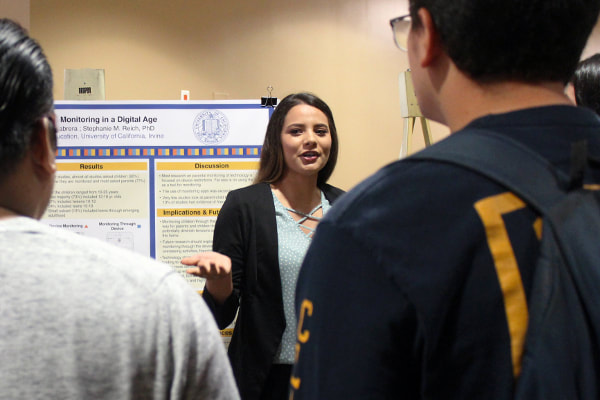|
Competitive Edge Summer Research Program
Symposium Presentation: August 16, 2018 UCI Student Center Title: "Parental Monitoring in a Digital Age" Presenter: Jennifer Cabrera Faculty Advisor: Stephanie M. Reich Abstract Parental monitoring involves parents implementing rules, encouraging appropriate behaviors and tracking children’s whereabouts, activities, and adaptations (Dischon & McMahon, 1998). Studies show that parental monitoring is associated with positive child outcomes, including academic achievement, reduced behavior problems, less risky behaviors, and fewer deviant friends (Amato & Fowler, 2002; Pettit et al., 2001; Kerr & Stattin, 2000). Nowadays, parental monitoring may be changing, as children are increasingly surrounded by digital devices and interacting with others through these devices. As new technologies such as the Internet and mobile phones are introduced into homes, there are other activities and interactions for parents to monitor (Nakayama, 2011). For instance, children now have multiple digital devices at their fingertips, which they can use to share whatever they want, through social media and text, to whomever they want. Although research on parental monitoring is robust, less has focused on digital activities and what exists is not well connected. To address this limitation, a review and synthesis was conducted on how parental monitoring is implemented in the 21st century. This qualitative synthesis focuses on (1) what parental monitoring looks like in a digital age and (2) how media and technology are used by parents to monitor their children. Studies included participants 10-25 years, with the vast majority (73%) including12-16 year-olds. From this review, it is clear that the bulk of research has focused on restrictions for using technology (phones, tablets, computers) and very little has studied monitoring through a device. This is an important omission given that mobile devices may offer a unique way for parents to see what their children are doing and sharing as well as with whom they are interacting. Future research should explore how parental monitoring through the device may be used as a tool for overseeing activities, friendships and behaviors online. This study connects the often studied, but older, construct of parental monitoring to the 21st century and highlights important gaps in the current research around parenting in a digital age. Comments are closed.
|
Resources for:
|
|


